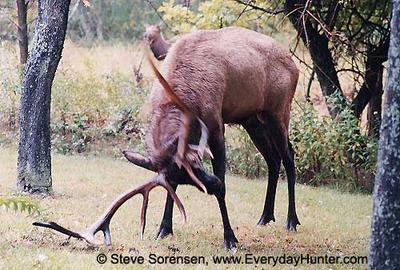Hunt Well, Do Good, Share the Harvest
by Steve Sorensen
(Originally published in the Warren Times Observer, Warren, PA., October 29, 2005.)
When I was a kid cutting my predatory teeth on venison chops, hunting seasons in Pennsylvania were much less liberal than they are today. People lived closer to the land, and depended on the meat they harvested as well as their own fresh garden produce. Many hunting families were like ours. We did our own butchering, sometimes with a family assembly line that processed venison from skinning to cutting to boning to grinding to packaging. Some people canned their venison, aging it for a period of months in broth-filled glass jars.Knowing your harvest can go to a benevolent
purpose might add an extra incentive
to your hunting, and it will surely add
extra value to your annual experience.
With today's availability of antlerless tags, many hunters now get two or even three deer in a season. Families tend to be smaller, and two or three deer can easily result in a surplus over and above what the hunter's family can use. Fortunately, it doesn't have to go to waste. An organization called "Hunters Sharing the Harvest" matches that surplus with people who can use it.
Hunters Sharing the Harvest (HSH) is a program through which hunters donate venison to needy families by way of commercial venison processors. Approved commercial processors will receive the hunter's legally harvested deer, butcher it and package it.
For several reasons, all the meat is ground. Ground meat goes further. It is easy to use in a variety of dishes, and takes no special recipes. It enables the butcher to treat all donated meat the same way. And no one gets a better cut than another person gets.
The hunter's participation doesn't end when he offers his deer to the program. He is also asked to donate a minimum of $15 (a small amount considering today's cost of a gun, gear and Gore-Tex) toward the processing fee. The statewide HSH organization, which raises money thorough fundraisers and donations, picks up the remainder of the tab, usually somewhere around forty additional dollars. A hunter can also choose to pay the butcher's full processing fee and specify that a portion of his meat be donated to the program.
The butchers pass the venison to regional food banks. Locally, the Salvation Army receives the meat and distributes it, allowing many non-hunting families -- and people who might not otherwise get much meat in their diets -- to satisfy their nutritional needs for protein with one of the healthiest meats available.
In Warren County, Wiles Meat Cutting, 403 Main St., Warren, PA 16365 (814-723-3999) participates in this program. According to the HSH website (www.ShareDeer.org), other processors who participate are Gobblerbrook Deer Processing in Pittsfield, PA (814-563-9657), and Columbus Custom Meats in Columbus, PA (814-664-7823). If you harvest a deer you don't plan on using, they'll take it off your hands and put it into the program so that someone who needs it can use it.
Today, fewer people hunt and some don't want to mess with their meat. Some don't know how, and occasionally venison even goes to waste. It's good that commercial venison processors are willing to provide this needed service.
Hunters can feel gratified when they hunt well, experience the satisfaction of harvesting a whitetail, and do good by offering food to someone who might go hungry without it. Venison is a resource, and it's great to see it being used in a worthy way. Knowing your harvest can go to a benevolent purpose might even add an extra incentive to your hunting, and it will surely add extra value to your annual experience.
If you're not a hunter, but would like to support this excellent program, you can donate by mailing a check (payable to Hunters Sharing the Harvest) to: John Plowman, 6780 Hickory Lane, Harrisburg, PA 17112. A contribution of just $25 can provide as many as 100 delicious meals. HSH is a 501(c)3 organization and your contributions are tax deductible. For more details, information is online at www.ShareDeer.org.



